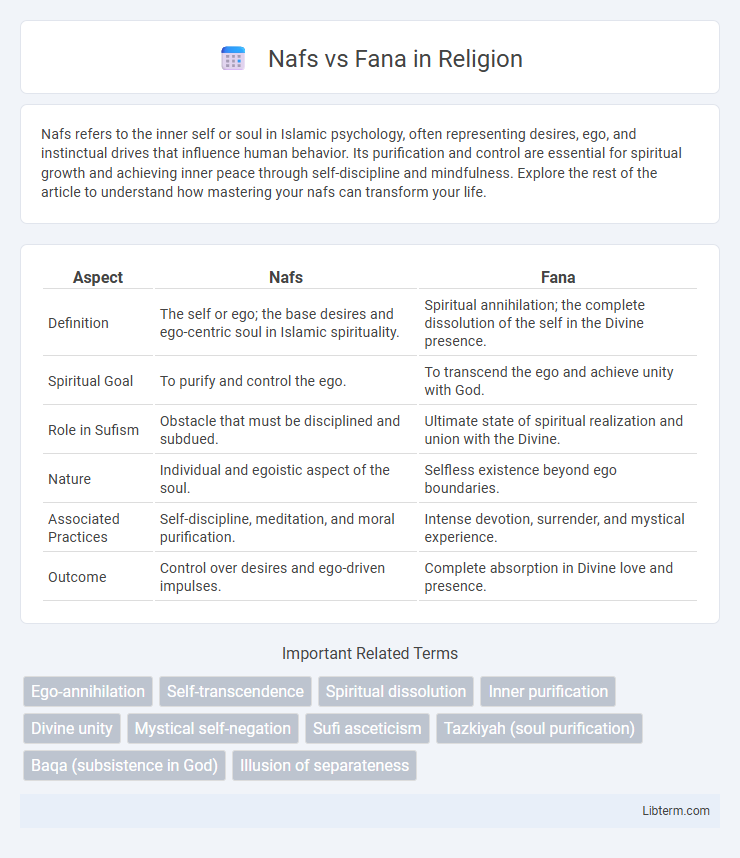Nafs refers to the inner self or soul in Islamic psychology, often representing desires, ego, and instinctual drives that influence human behavior. Its purification and control are essential for spiritual growth and achieving inner peace through self-discipline and mindfulness. Explore the rest of the article to understand how mastering your nafs can transform your life.
Table of Comparison
| Aspect | Nafs | Fana |
|---|---|---|
| Definition | The self or ego; the base desires and ego-centric soul in Islamic spirituality. | Spiritual annihilation; the complete dissolution of the self in the Divine presence. |
| Spiritual Goal | To purify and control the ego. | To transcend the ego and achieve unity with God. |
| Role in Sufism | Obstacle that must be disciplined and subdued. | Ultimate state of spiritual realization and union with the Divine. |
| Nature | Individual and egoistic aspect of the soul. | Selfless existence beyond ego boundaries. |
| Associated Practices | Self-discipline, meditation, and moral purification. | Intense devotion, surrender, and mystical experience. |
| Outcome | Control over desires and ego-driven impulses. | Complete absorption in Divine love and presence. |
Understanding the Concept of Nafs
The concept of Nafs in Islamic spirituality refers to the self or ego that encompasses desires, impulses, and base instincts, often considered the source of human struggle against moral and spiritual growth. Nafs is categorized into stages, such as Nafs al-Ammarah (the commanding self prone to evil) and Nafs al-Lawwamah (the self-reproaching conscience), highlighting the evolving inner state that a believer must understand and overcome. Recognizing and disciplining the Nafs is essential for advancing towards Fana, which signifies the annihilation of the ego and union with the divine presence.
Exploring the Meaning of Fana
Fana, a key concept in Sufism, refers to the annihilation of the self or ego, leading to a complete union with the Divine presence. Unlike the Nafs, which represents the ego-driven self prone to desires and worldly attachments, Fana signifies transcending these lower aspects to attain spiritual purity and enlightenment. This state marks the dissolution of individual identity, allowing the mystic to experience the absolute reality beyond the self.
The Spiritual Journey: From Nafs to Fana
The spiritual journey from Nafs to Fana represents the transformative process in Sufism where the ego (Nafs) is purified and ultimately annihilated (Fana) to achieve unity with the Divine. Nafs often embodies desires and the self-centered ego, which must be disciplined through practices like Dhikr (remembrance of God) and Tawba (repentance). Fana signifies the extinction of the individual self, leading to Baqa, a state of eternal existence in harmony with God's will, marking the pinnacle of spiritual realization.
Stages of Purification of the Nafs
The stages of purification of the Nafs include Nafs al-Ammara (the commanding self), Nafs al-Lawwama (the self-reproaching soul), and Nafs al-Mutma'inna (the peaceful soul), each representing progressive levels of spiritual refinement. Nafs al-Ammara inclines toward base desires, requiring disciplined control to advance to Nafs al-Lawwama, marked by self-awareness and regret for wrongdoing. The culmination is Nafs al-Mutma'inna, where the soul attains tranquility and aligns with divine will, facilitating the spiritual state of Fana, or annihilation of the self, signifying complete union with the Divine.
Achieving Fana: The Annihilation of the Self
Achieving Fana involves the complete annihilation of the self, where the ego (Nafs) dissolves into the divine presence, eliminating individual desires and attachments. This spiritual state transcends the Nafs's lower impulses, allowing the seeker to experience unity with God and eternal peace. Practices such as rigorous meditation, self-discipline, and surrender facilitate the journey from ego-centered awareness to divine absorption.
Nafs in Islamic Mysticism and Sufism
Nafs in Islamic mysticism and Sufism represents the ego or the lower self that inclines towards desires and worldly attachments, often seen as the primary obstacle on the spiritual path. It is classified into stages such as Nafs al-Ammara (commanding self), which urges negative impulses, Nafs al-Lawwama (self-reproaching self), reflecting self-awareness and remorse, and Nafs al-Mutmainna (peaceful self), symbolizing tranquility after spiritual purification. Mastery and purification of the Nafs through practices like dhikr and muraqaba are essential steps toward achieving Fana, the annihilation of the ego in divine presence.
Fana as Union with the Divine
Fana represents the spiritual state of complete annihilation of the ego, leading to the union with the Divine in Sufi mysticism. This profound experience transcends the self (Nafs), dissolving individual identity into the infinite presence of God. Achieving Fana signifies the ultimate goal of Sufi practice, where the seeker attains divine unity and eternal oneness.
Challenges in Overcoming the Nafs
Overcoming the Nafs poses significant challenges due to its deep-rooted desires and ego-driven impulses that continuously lure individuals toward selfishness and distraction from spiritual growth. The process demands rigorous self-discipline, persistent self-awareness, and surrender of one's ego to attain the state of Fana, where the self dissolves in divine unity. Persistent struggle against internal temptations and the cultivation of virtues like patience, humility, and sincerity are essential to transcend the Nafs and reach spiritual annihilation (Fana).
Signs of True Fana in the Seeker
True Fana in the seeker manifests as the complete dissolution of the ego (nafs) and the transcendence of individual desires, leading to unwavering surrender to the Divine will. Signs include profound inner peace, detachment from worldly attachments, and an unshakable presence of divine love and awareness. The seeker experiences a state of spiritual annihilation where self-centered thoughts vanish, replaced by continuous remembrance and unity with God.
Integrating Nafs and Fana in Daily Spiritual Practice
Integrating nafs and fana in daily spiritual practice involves balancing the self's ego-driven desires with the annihilation of the ego to achieve spiritual unity. Practices such as meditation, prayer, and self-reflection help purify the nafs, allowing the practitioner to experience fana, or the dissolution of the self in divine presence. Consistent effort in harmonizing these concepts fosters inner peace, spiritual growth, and a deeper connection to the divine essence.
Nafs Infographic

 libterm.com
libterm.com